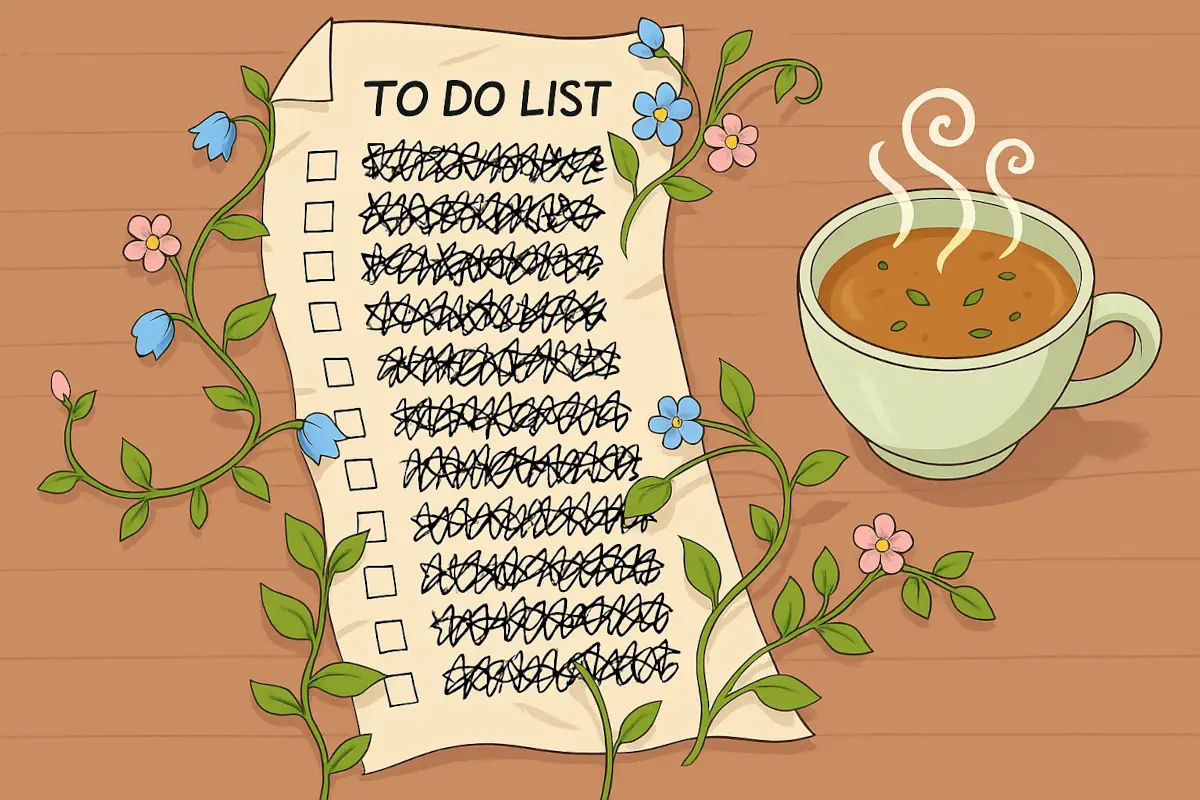Releasing “Productivity Guilt”: A Tapping Script for When You Need to Rest
Inspired by the Wisdom of Stephen Covey
I. Introduction: Stepping Into the Forest of Effectiveness
In the forest of your daily life, your mind is the saw you carry. When it’s sharp, every task feels lighter. You cut through obstacles with speed and precision. But with each day of unbroken effort—meetings stacked like fallen logs, endless messages demanding your attention—the blade dulls. It begins to drag. Your grip tightens. The work demands more force than you have.
And yet, a voice whispers from somewhere deep within—or maybe from the world around you: “Don’t stop. Keep sawing. Your value depends on it.”
This is productivity guilt—a cultural heirloom passed from one generation to the next. We didn’t choose it, but we’ve worn it like an invisible yoke. It tells us that our worth is measured in completed checklists, late nights, and “just pushing through.”
Stephen Covey, whose 7 Habits of Highly Effective People has guided millions, offered a radical counterpoint: “We must never become too busy sawing to take time to sharpen the saw.”
Rest, in Covey’s view, isn’t indulgence. It’s the strategic advantage of the truly effective. The tapping practice you’re about to experience is the whetstone for your blade—a way to lay down inherited guilt, step out of the cycle of relentless doing, and return renewed. Because rest doesn’t set you back. It quietly prepares you for your next leap forward.
II. Understanding Productivity Guilt: The Inherited Myth
Picture this:
- Your shoulders hunched, eyes scanning the screen.
- The email icon pulses.
- The clock advances faster than your to-do list.
- A faint ache spreads across your temples.
Now picture this instead:
- Your back rests against a soft chair.
- A warm mug heats your palms.
- The air is still except for the sound of rain.
- Your breath deepens and slows.
The juxtaposition is stark—and yet, for many, the second image is tinged with discomfort. That’s productivity guilt. It’s the unease you feel when you’re not “doing enough.” It’s the cultural conditioning that equates stillness with laziness. It’s a mental reflex shaped by a relentless work culture that prizes visibility over vitality, comparison to peers who appear endlessly “on,” and internalized beliefs—often learned in childhood—that rest must be earned.
This inherited myth costs us deeply:
- Physically: Tension in the chest, knotted shoulders, exhaustion.
- Mentally: Racing thoughts, inability to focus.
- Emotionally: A constant hum of anxiety, the feeling of always being “behind.”
But myths can be rewritten. And when you release productivity guilt, you reclaim something vital: the freedom to rest without the weight of judgment.
III. Why Releasing Guilt Unlocks True Rest
Guilt is not just a passing feeling—it’s an active disruptor of rest. When you lie down to read or nap, and your mind hisses, “You should be doing something,” your body’s stress hormones spike. Cortisol floods your system. Muscles stay tight. The nervous system never drops into repair mode.
Science is clear: real recovery happens only when the mind feels safe to pause. Covey’s Habit 7 reframes rest as investment: each moment of renewal compounds into greater clarity, creativity, and resilience. By releasing guilt, you make space for rest to actually restore you—so when you return to work, you don’t just continue… you elevate.
Think of high-performance athletes: training schedules are built around recovery days. The world’s top thinkers and creators defend their downtime with the same rigor as their most important projects. They understand a truth our culture forgets—rest isn’t the opposite of achievement; it’s the foundation of it.
IV. Tapping Script: Releasing Productivity Guilt
Setup Statement (Karate Chop Point) — repeat three times:
“Even though I feel guilty for resting and not being productive, I deeply and completely accept myself.”
Tapping Points & Reminder Phrases
- Top of Head: “This guilt about not doing enough.”
- Eyebrow: “Feeling like I should be working right now.”
- Side of Eye: “It’s hard to relax when the list is unfinished.”
- Under Eye: “I worry I’m letting others—or myself—down.”
- Under Nose: “This pressure to be productive at all times.”
- Chin: “Fear of judgment for taking a break.”
- Collarbone: “I want to let go of this guilt and sharpen my saw.”
- Under Arm: “I deserve to rest and recharge.”
After one round, pause. Check your intensity rating. Notice if the tightness has shifted, even slightly.
Then add reframing phrases:
- “Even though my value isn’t measured by my productivity, I allow myself to rest.”
- “Rest is not a reward—it’s part of my strategy for success.”
- “I choose to put first things first—and right now, that means renewal.”
V. Transitioning Into Self-Compassion
Close your eyes. Picture your saw—your mind, your body—resting on the workbench. See yourself gently running the whetstone along its edge. With each stroke, tension drains away. Your breath slows.
Invite in these truths:
- “I am worthy of rest, just as I am.”
- “Rest is an investment in my future strength.”
- “My worth isn’t measured by output alone, but by the values I live.”
Pair your tapping with slow, deep breathing, soft music, or gentle stretches. Let your nervous system understand: It is safe to stop.
VI. Conclusion: Rest as the Habit of Greatness
Rest is a right, not a prize for “enough” productivity. The myth of busyness is strong—but it’s not unbreakable. Every time you use this tapping script, you’re doing more than easing stress. You’re sharpening your saw. You’re rejecting an inherited belief and replacing it with one that serves you: Effectiveness flows from renewal.
So the next time guilt knocks, remember: The saw cuts better when sharpened. The tide returns stronger after it ebbs. The field yields more after it lies fallow. Rest restores. Rest empowers. And rest—chosen with intention—is the most strategic move you can make.



